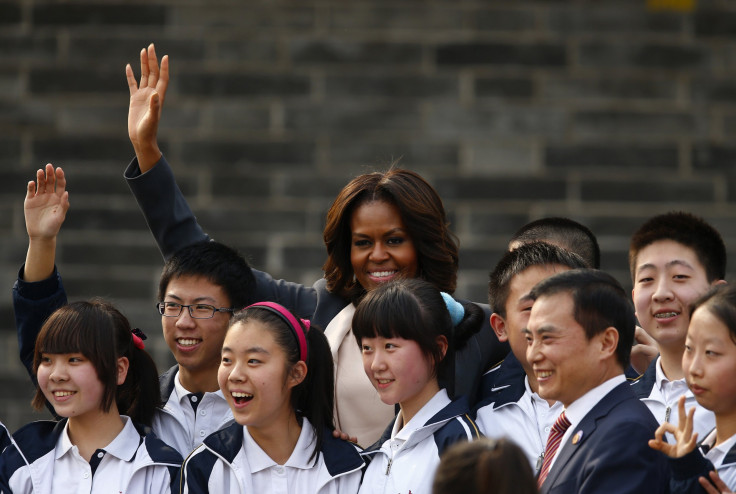Michelle Obama China Goodwill Trip Recap: Ping Pong, The Great Wall And Internet Freedom [PHOTOS]

Michelle Obama was in Beijing over the weekend, kicking off a goodwill trip to China, without her husband. Though the first lady's visit was intended primarily as a cultural tour, Ms. Obama used her only major speech to promote Internet freedom.
For the first lady's first solo trip to China, she brought along daughters Sasha and Malia and her mother, Marian Shields Robinson, and they were hosted by China’s First Lady, Peng Liyuan. Ms. Obama tried her hand at pingpong and calligraphy, made an obligatory tourist stop at the Great Wall, and paid a visit to the ancient Terracotta Warriors.
A big promoter of educational and cultural ties between the U.S. and China, Ms. Obama made several stops at universities and schools. China’s Foreign Ministry spokesperson Hong Lei said that the trip “will play an important role in increasing mutual understanding between the two countries and expanding friendship.” Addressing an audience of about 200 students from American and Chinese backgrounds, the first lady promoted the value of foreign exchange education and studying different cultures.
However, during the same speech at the Stanford Center at one of China’s top universities, Peking University, known locally as "Beida," the first lady also highlighted the importance of censorship-free access to information on the Internet, something that China has not had since the implementation of the Great Firewall Internet censorship system. “It is so important for information and ideas to flow freely over the Internet and through the media,” she said in her speech. “Because that’s how we discover the truth, that’s how we learn what’s really happening in our communities, in our country and our world.”
Ms. Obama’s speech also ventured into the topics of uncensored debate, government criticism and other rights that are not exercised very freely in China. “Believe me, I know how this can be a messy and frustrating process,” she said. “My husband and I are on the receiving end of plenty of questioning and criticism from our media and our fellow citizens, and it’s not always easy, but we wouldn’t trade it for anything in the world. Because time and again, we have seen that countries are stronger and more prosperous when the voices and opinions of all citizens can be heard.”
© Copyright IBTimes 2024. All rights reserved.












